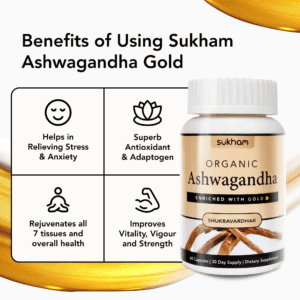Ashwagandha is a popular herb in Ayurveda, the traditional system of medicine in India. It has been used for centuries to treat various conditions, such as stress, anxiety, fatigue, pain, inflammation, and more. Ashwagandha is also known as Indian ginseng or winter cherry, and its botanical name is Withania somnifera.
What are the benefits of Ashwagandha?

Ashwagandha has many health benefits, thanks to its active compounds called withanolides, which have anti-inflammatory, antioxidant, and adaptogenic properties. Adaptogens are substances that help the body cope with stress and balance its functions. Some of the benefits of ashwagandha include:
- Reducing stress and anxiety: Ashwagandha can lower the levels of cortisol, the stress hormone, and improve the mood and mental well-being of people who suffer from chronic stress or anxiety disorders.
- Improving athletic performance: Ashwagandha can enhance physical performance, strength, endurance, and muscle mass in athletes and healthy individuals. It can also reduce muscle damage and inflammation caused by exercise.
- Boosting testosterone and fertility: Ashwagandha can increase the levels of testosterone, the male sex hormone, and improve the quality and quantity of sperm in men with low fertility. It can also improve the sexual function and satisfaction of both men and women.
- Lowering blood sugar levels: Ashwagandha can improve the insulin sensitivity and glucose metabolism of people with diabetes or prediabetes. It can also prevent or delay the onset of diabetes in people at risk.
- Fighting inflammation and infections: Ashwagandha can modulate the immune system and reduce the inflammation and oxidative stress that contribute to many chronic diseases. It can also protect against viral, bacterial, and fungal infections.
- Enhancing cognitive function and memory: Ashwagandha can improve the brain function, learning, memory, and attention of healthy people and those with cognitive impairment or neurodegenerative diseases. It can also protect the brain from damage and aging.
How to use Ashwagandha?
Ashwagandha can be consumed as capsules that can be taken orally with water. The recommended dosage is one capsule twice a day, preferably after meals. The dosage may vary depending on the individual’s age, weight, health condition, and desired results. It is advisable to consult a doctor before using it, especially if you have any medical conditions or are taking any medications.
However, not all ashwagandha products are created equal. Some may have low quality, purity, or potency, and may contain contaminants or additives that can reduce their effectiveness or cause side effects. Therefore, it is important to choose a reliable and certified source should also be considered.
Sukham Organic Ashwagandha capsules are 100% Ayurvedic and are FSSAI and USFDA certified. It has also been clinically tested for heavy metals and quality tested by NABL Accredited Labs. It is suitable for anyone who wishes to naturally alleviate stress, enhance sleep quality, facilitate muscle recovery, and boost strength and endurance.
The Triple Trituration Technique (TTT-120): A Superior Way to Prepare Ashwagandha

One of the ways to ensure the quality and efficacy of ashwagandha is to use the Triple Trituration Technique (TTT-120), a special method of processing the herb based on the ancient principles of Ayurveda. The TTT-120 involves three steps:
- Trituration: This is the process of grinding the ashwagandha root or leaves into a fine powder, using a mortar and pestle. This helps to break down the cell walls and release the active compounds of the herb.
- Bhavana: This is the process of moistening the ashwagandha powder with a liquid medium, such as water, milk, or juice, and then triturating it again. This helps to enhance the solubility and absorption of the herb’s nutrients.
- Marana: This is the process of drying the ashwagandha powder under controlled conditions, such as temperature, humidity, and time. This helps to preserve the stability and potency of the herb.
The TTT-120 method repeats these three steps 120 times, resulting in a highly refined and concentrated ashwagandha powder that has 3 times the effects of regular ashwagandha. The TTT-120 ashwagandha powder can be further enriched with gold water, which is water infused with gold nanoparticles, to increase its bioavailability and benefits.
What are the side effects and safety of ashwagandha?
Ashwagandha is generally safe and well-tolerated by most people, especially when taken in moderate doses and for short periods of time. However, some people may experience mild side effects, such as headache, nausea, diarrhea, or allergic reactions, especially if they are sensitive to the herb or take high doses.
Ashwagandha may also interact with some medications, such as blood thinners, blood pressure drugs, diabetes drugs, thyroid hormones, or antidepressants, and may alter their effects or cause adverse reactions. Therefore, people who are taking any medication should consult their doctor before using it.
Ashwagandha is not recommended for pregnant or breastfeeding women, as it may affect the hormonal balance and the development of the fetus or the infant. It is also not advised for people with autoimmune diseases, such as rheumatoid arthritis, lupus, or multiple sclerosis, as it may stimulate the immune system and worsen the symptoms.
Summary
Ashwagandha is a powerful herb that has many benefits for health and wellness. It can help reduce stress and anxiety, improve athletic performance, boost testosterone and fertility, lower blood sugar levels, fight inflammation and infections, and enhance cognitive function and memory. The Triple Trituration Technique (TTT-120) is a superior way to prepare ashwagandha, as it increases its potency, bioavailability, and benefits.









